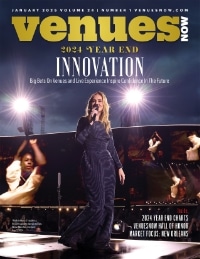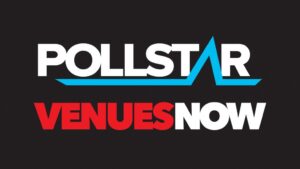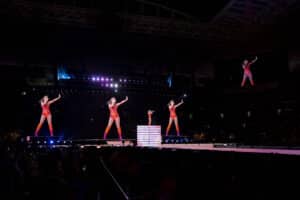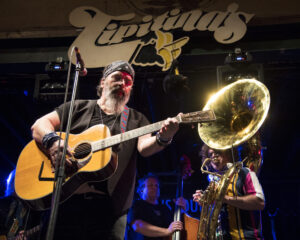
Nick Nuciforo has been the head for comedy at UTA since 2015 when he was made a partner in the talent agency. Previously, Nuciforo ran the comedy touring division at APA and he founded CAA’s comedy touring division.
His UTA clients include some of the biggest names working today. The roster includes Ali Wong, Jeff Dunham, Jim Gaffigan, Sebastian Maniscalco, Chris Tucker, Flight of the Conchords, George Lopez, Jeff Foxworthy, Sarah Silverman, Seth Meyers, The Lonely Island, The Tenderloins, Wanda Sykes and Will Ferrell.
VenuesNow spoke to the veteran agent about comedy touring in 2019.
How’s comedy live touring doing in 2019?
Fan awareness of and passion for comedic artists is at an all-time high. Our clients are breaking new ground and setting records.
Who’s hot in 2019?
A cross-section of artists from every imaginable genre is breaking through this year. Nate Bargatze, John Crist, Hannah Gadsby, Ilana Glazer, Bert Kreischer and The Lonely Island are all playing to sold-out houses on their first major concert tours. Ali Wong is doing 12 show residencies at the Wiltern Theatre in Los Angeles and The Masonic in San Francisco. I’m also very excited about The Lonely Island, who sold out their entire tour as soon as tickets went on sale. The Tenderloins continue to have strong sales for their arena dates. Jim Jefferies just completed a sold-out arena tour in Australia and is scheduled to continue the tour in the UK and Europe later in 2019.
What are the hot genres in comedy this year?
The international comedy scene is rapidly expanding and are so busy we now have a team of full-time comedy touring agents in our London office. Russell Peters was the first performer to headline the Coca-Cola Arena in Dubai this past June. Jim Gaffigan was the first international comedian to perform in Athens and just set the attendance record for the largest English language stand-up show in Beijing. Jim Jefferies set records for the largest English language stand-up shows in Korea and Taiwan earlier this year. International artists are also performing North American tours in their native languages, including Brazilian comedian Whindersson Nunes, who traveled across the U.S. performing shows in Portuguese. Podcasts are big business. They are trending as both a promotional platform for artists and a live touring experience of the actual podcasts themselves. Our clients My Favorite Murder and My Dad Wrote a Porno are setting attendance and ticket sales records for live podcast performances. My Dad Wrote a Porno shot and released an HBO special of their live tour this year, and My Favorite Murder just launched the first-ever artist-driven podcast destination event called “My Favorite Weekend,” which takes place in Santa Barbara on Nov 1-3.
How have Netflix and YouTube clips and streaming helped the comedy live touring business?
For the first time ever, comedy is getting distributed in a way where there is unlimited access to content. In the era of linear TV networks running comedy specials, you had to tune in to watch a comedy special on a specific day, date, and time. After the initial premiere of the special, it was difficult to find. Comedy audio distribution was limited to retail. Albums, CDs, and cassettes were located in hard-to-find bins at the record store.
Thanks to distribution platforms like YouTube, SiriusXM, Pandora, Spotify, Netflix, and now Amazon and HBO Max, you can now consume stand-up comedy 24 hours a day from anywhere in the world. And millions of people are doing it. Comedians are finding new fans and consumer awareness of specific comedy artists is at an all-time high.
YouTube is everywhere. There are people in third world countries who have the ability to watch comedy on their mobile phones. This platform has been the leading driver of the international comedy boom. Our clients are no longer constrained by the geographical reach of a TV network.
Comedy is made for social media. Comedians are multi-hyphenates. They perform, but they also write, act, and create. Social media is perfect for the art form of comedy. Our clients build followings, make viral videos, and comment on the world in real time. Their ability to go viral via Twitter, Facebook, YouTube and Instagram is exposing comedians to new fans and creating an opportunity to sell tickets. Thus, social media is useful not only as a marketing tool, but as a means of distribution that the artist entirely controls. With all of these new distribution platforms, there are increased opportunities to sell film and TV content. We have been able to increase deal flow and content output for our clients, accelerating their growth as artists. UTA has the very best film and TV departments for comedy, which is a major reason for our success. Comedy touring doesn’t work as well in an environment where a client’s career is not supported in all areas. We can help an artist achieve faster growth in touring if the client is aggressively represented in all areas of the business.
Are there regions of the country where comedy does better than others?
This answer totally depends on the type of client and understanding their individual fan base. Not all comedians are the same. Some comedians sell better in the suburbs and outside of major metropolitan areas, and other comedians play stronger in urban areas like Brooklyn and college towns like Madison. That being said, I have some theories on where tickets sell: cities with a large population base do well for comedy. When there are more people, the odds are in your favor that there will be more fans of any given artist. We are pretty much seeing success anywhere there are a large number of construction cranes in the sky. Boom towns like Denver, Nashville, Austin and Tampa have had a large influx of people. These cities attract young people, who are generally more interested in seeing live comedy shows. When the economy is strong and unemployment is low, people have money to spend on comedy tickets.
Cities with a strong comedy club and scene have built audiences that are more familiar with live comedy as an art form. Comedians who developed in these clubs prior to headlining their first concerts in the market normally have a strong base of grass roots followers who they can access via social media as well as morning radio relationships.
We’ve heard anecdotally that grosses from comedy touring have gone up about 5% a year for the
last five years. Does this sound right to you? Do you think 5% growth is achievable over the next
few years?
I believe we can exceed 5% year-over-year growth. Most comedy shows have an average ticket price below the true market value of the act. Our research shows that comedy fans spend more money on sports, theater, and music tickets than they do on comedy tickets. We are able to maximize gross income by focusing on revenue generation tools like Ticketmaster Platinum, dynamic ticket pricing, flexing, aisle seat bumps, and simply understanding the differences in demand for different sections of the house. You also have to work both ends of the spectrum. Getting the price right for the most passionate fan is great, but you need to maintain a “get in” price that is reasonable enough to entice the casual fan. After all, this is still a game of supply and demand.
And let’s not forget about the growth of an artist’s career and fanbase. For some artists, we are seeing substantial annual growth in gross before we apply any of these tools.
Do notice any differences between representing comedians than your colleagues who represent
music acts?
There are nuances in comedy that you have to be a part of the scene to understand: Not all comedy artists are the same, nor do they all compete with each other. We have to understand the comedian’s audience and how to reach it.
The things that are important for a good show are different in comedy. Most comedians like a focused environment with no bars or distractions in the room. The sound for a spoken word must be impeccable. If you can’t clearly hear the joke, the audience will not be happy. Some of our clients even use Yondr bags to eliminate the distraction of cell phones.
Fans are willing to go see a music artist multiple times to hear the same songs. Once a joke is told, the magic trick is dead, so we need to be cautious about booking a return engagement before the comedian has enough new material. In contrast, music fans are upset if the act doesn’t play the hits. Most comedians tour without production and with a very limited touring party. This allows them to fly to all of their shows. They don’t have the same routing requirements for mileage and can play gigs regardless of location.
Do your clients ever say ‘I want to go to this venue’ or ‘I want to go to that venue’?
Most clients have a very distinct point of view about venues. Venues have an identity and a reputation. Clients and managers ask for venues by name if they are perceived to be better for comedy, strong ticket sellers, or prestigious. Additionally, some clients may want to stay in a city and play 4-6 shows instead of playing one show at the arena, while others want to play one show and move to the next town. Our clients are very involved in these discussions, as venue choice affects the quality of the show and their lifestyle. For example, if there is a limited amount of time in a client’s schedule, they may opt to play the arena instead of multiple theater shows.
Is comedy recession proof?
There is still plenty of room for growth as we haven’t yet reached market maturity. Each year, more of our clients are breaking into theaters and matriculating up the ranks. Comedy ticket prices remain relatively low compared to the cost of other entertainment genres, so there is room to grow concert grosses. It is also my belief that when the economy struggles and times get tough, people seek laughter as a form of entertainment. I have a great deal of confidence for the health of this sector.
The current touring landscape is a testament to the timeless appeal of comedy as a communal live experience. When you look back almost 20 years to 9/11, there was a belief that comedy was dead. Now, the exact opposite is true. The comedy touring industry is flourishing more than ever before. In good times and bad times, people have a profound desire to laugh, and that experience is amplified and intensified when in the company of others. Laughter is infectious.
READ ON:
Kevin Hart: Serious Business
The Circuit: The word from comedy venues around the country
Hot Tickets: Comedy 2019







